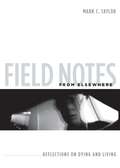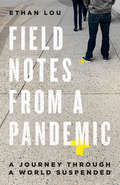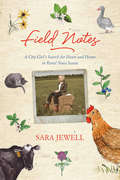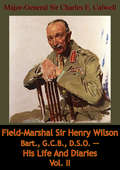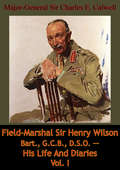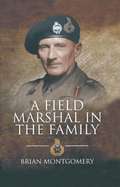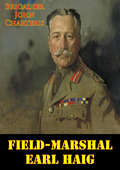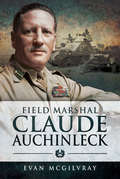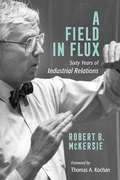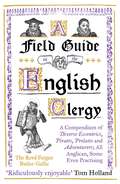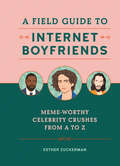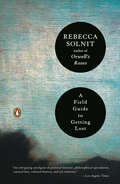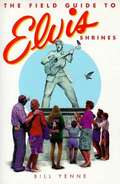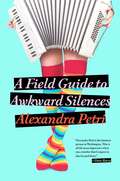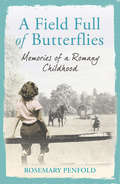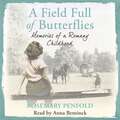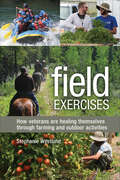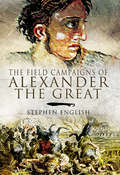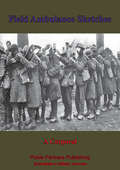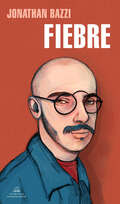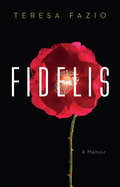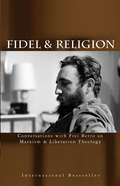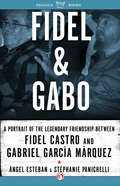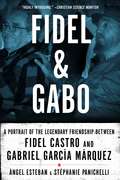- Table View
- List View
Field Notes from Elsewhere: Reflections on Dying and Living
by Mark C. TaylorIn the fall of 2005, Mark C. Taylor, the controversial public intellectual and widely respected scholar, suddenly fell critically ill. For two days a team of forty doctors, many of whom thought he would not live, fought to save him. Taylor would eventually recover, but only to face a new threat: surgery for cancer. "These experiences have changed me in ways I am still struggling to understand," Taylor writes in this absorbing memoir. "After the past year, I am persuaded that I have done enough fieldwork to write a book that combines philosophical and theological reflection with autobiographical narrative. Writing is not only possible but actually seems necessary." Field Notes from Elsewhere is Taylor's unforgettable, inverted journey from death to life. Each of his memoir's fifty-two chapters and accompanying photographs recounts a morning-to-evening experience with sickness and convalescence, mingling humor and hope with a deep exploration of human frailty and, conversely, resilience. When we confront the end of life, Taylor explains, the axis of the lived world shifts, and everything must be reevaluated. As Taylor sorts through his remembrances, much that once seemed familiar becomes strange, paradoxical, and contradictory. He reads his experience with and against ghosts from his past, recasting the meaning of mortality, sacrifice, solitude, and abandonment, along with a host of other issues, in light of modern ways of dying. "You never come back from elsewhere," Taylor concludes, "because elsewhere always comes back with you."
Field Notes from a Pandemic: A Journey Through a World Suspended
by Ethan LouEqual parts travelogue and pandemic guide, journalist Ethan Lou examines the societal effects of COVID-19 and takes us on a mesmerizing journey around a world that will never be the same.Visiting Beijing in January to see his dying grandfather, Canadian journalist Ethan Lou unknowingly walks into a state under siege. In his journey out of China and into other hot zones in Asia and Europe, he finds himself witnessing the very earliest stages of a virus that will forever change the world as we know it. Lou argues that Coronavirus will have a far greater impact than SARS, for example, simply because China is now many more times integrated with the increasingly interconnected world. Over decades, globalization has crafted a world painfully sensitive and susceptible to shocks such as this pandemic. A crisis like it has thus been long overdue--and we have yet to see it unfold fully. In our integrated world, events that may previously be isolated now ripple farther and wider and in ways we do not expect and cannot foresee. We have not seen the worst, and if and when we outlast this pandemic, nothing will ever be the same--not just healthcare systems but also economies, politics and culture. Decisions now--or indecisions--will shape and define the world for decades.These ideas are fleshed out through the virus's spawning and how it spread, the unprecedented measures to contain it and an examination of past pandemics and other crises and how they shaped the world--and an argument for why this one's different. Lou shows how drastically the virus has transformed the world and charts the greater and more radical shifts to come. His ideas and arguments are framed around his journey around the world, whose path the virus seemed to follow until he landed safely in quarantine in a small town in Germany where he was able to take stock and start telling his story.
Field Notes: A City Girl's Search for Heart and Home in Rural Nova Scotia
by Sara JewellReflections on country life on Canada&’s eastern coast: &“Gentle humor and prose as clear and lilting as the song of the hermit thrush at dusk.&” —Deborah Carr, author of Sanctuary: The Story of Naturalist Mary Majka Sara Jewell has lived at eighteen different addresses—but there was one that remained constant: Pugwash Point Road in rural Nova Scotia. She was nine years old the first time her family vacationed in the small fishing village about an hour from the New Brunswick border, and the red soil stained her heart. Life, as it&’s wont to do, eventually took Jewell away from the east coast. But when her marriage and big-city life started to crumble, she wanted only one thing: a fresh start in Pugwash.Field Notes includes forty-one essays on the differences, both subtle and drastic, between city life and country living. From curious neighbors and unpredictable weather to the reality of roadkill and the wonders of wildlife, award-winning narrative journalist Sara Jewell strikes the perfect balance between honest self-examination and humorous observation—in a delightful memoir accented with original drawings by Joanna Close. &“A born storyteller . . . her sharp-witted but kind-hearted portraits of country people, places, and customs make for a remarkable first book.&” —Harry Thurston, author of A Place Between the Tides and the Deer Yard
Field-Marshal Sir Henry Wilson Bart., G.C.B., D.S.O. — His Life And Diaries Vol. II (Field-Marshal Sir Henry Wilson Bart., G.C.B., D.S.O. — His Life And Diaries #2)
by Marshal Ferdinand Foch Major-General Sir Charles E. CalwellThese two volumes form the official biography of Sir Henry Wilson, a key figure in the British Army during the First World War, who was a passionate "Westerner" and advocate of the Anglo-French alliance. Major-General C. E. Callwell recounts the story of the outspoken, opinionated and well connected Field Marshal using extensive quotes from his diary, often dripping with acerbic wit, in the greatest of detail."Field Marshal Sir Henry Wilson, an Irishman who in June 1922 was assassinated on his doorstep in London by Irish republicans, was one of the most controversial British soldiers of that age. Before 1914 he did much to secure the Anglo-French alliance and was responsible for the planning which saw the British Expeditionary Force successfully despatched to France after the outbreak of war with Germany. A passionate Irish unionist, he gained a reputation as an intensely 'political' soldier, especially during the 'Curragh crisis' of 1914 when some officers resigned their commissions rather than coerce Ulster unionists into a Home Rule Ireland. During the war he played a major role in Anglo-French liaison, and ended up as Chief of the Imperial General Staff, professional head of the army, a post he held until February 1922. After Wilson retired from the army, he became an MP and was chief security adviser to the new Northern Ireland government. As such, he became a target for nationalist Irish militants, being identified with the security policies of the Belfast regime, though wrongly with Protestant sectarian attacks on Catholics. He is remembered today in unionist Northern Ireland as a kind of founding martyr for the state. Wilson's reputation was ruined in 1927 with the publication of an official biography, which quoted extensively and injudiciously from his entertaining, indiscreet, and wildly opinionated diaries, giving the impression that he was some sort of Machiavellian monster."-Professor Keith Jeffrey.
Field-Marshal Sir Henry Wilson Bart., G.C.B., D.S.O. — His Life And Diaries Vol. I (Field-Marshal Sir Henry Wilson Bart., G.C.B., D.S.O. — His Life And Diaries #1)
by Marshal Ferdinand Foch Major-General Sir Charles E. Calwellthe First World War, who was a passionate "Westerner" and advocate of the Anglo-French alliance. Major-General C. E. Callwell recounts the story of the outspoken, opinionated and well connected Field Marshal using extensive quotes from his diary, often dripping with acerbic wit, in the greatest of detail."Field Marshal Sir Henry Wilson, an Irishman who in June 1922 was assassinated on his doorstep in London by Irish republicans, was one of the most controversial British soldiers of that age. Before 1914 he did much to secure the Anglo-French alliance and was responsible for the planning which saw the British Expeditionary Force successfully despatched to France after the outbreak of war with Germany. A passionate Irish unionist, he gained a reputation as an intensely 'political' soldier, especially during the 'Curragh crisis' of 1914 when some officers resigned their commissions rather than coerce Ulster unionists into a Home Rule Ireland. During the war he played a major role in Anglo-French liaison, and ended up as Chief of the Imperial General Staff, professional head of the army, a post he held until February 1922. After Wilson retired from the army, he became an MP and was chief security adviser to the new Northern Ireland government. As such, he became a target for nationalist Irish militants, being identified with the security policies of the Belfast regime, though wrongly with Protestant sectarian attacks on Catholics. He is remembered today in unionist Northern Ireland as a kind of founding martyr for the state. Wilson's reputation was ruined in 1927 with the publication of an official biography, which quoted extensively and injudiciously from his entertaining, indiscreet, and wildly opinionated diaries, giving the impression that he was some sort of Machiavellian monster."-Professor Keith Jeffrey.
A Field Marshal in the Family
by Brian MontgomeryField Marshal Viscount Montgomery of Alamein has attracted the attention of countless historians over the last 70 years but, despite this coverage, views of his character remain controversial and contradictory. His younger brother Brian, himself a successful soldier, enters the fray with this charming and revealing book examining the background of this legendary military commander. He provides a fascinating account of the influences of Montys family genes together with a wealth of unknown details about his career. His grandfather, Sir Robert Montgomery, played a key role in crushing the Indian Mutiny and his adventures have intriguing parallels with those of Montys two generations later. Dean Farrar, his maternal grandfather, was a powerful Victorian educational and religious figure (Headmaster of Marlborough College and Dean of Canterbury) and author of the iconic Eric, or Little by Little.The author examines in the most entertaining and frank manner Montys idiosyncratic character traits; his opposition to tradition, his Nelsonian approach to rules and regulations, his ruthlessness and determination and his unfashionable views on the absolute necessity for self publicity and the most intensive training to get the maximum from his subordinates, down to the most junior levels.
Field-Marshal Earl Haig
by Colonel John Buchan Brigadier John CharterisIncludes 30 maps, plans and illustrations.A detailed personal account of Earl Haig, the man and his principle campaigns, by his closest colleague and confidante. The renowned novelist Buchan, who served under Chateris during the First World War, provides a foreword.“General Charteris had the privilege of serving with Lord Haig in India and at Aldershot, and for the whole of the Great War with the exception of the last two months. During the Battle of the Somme I had the privilege of serving under General Charteris. When, in 1921, the Official History was taking shape, Sir J. E. Edmonds asked Lord Haig whom he would like to go through it on his behalf, with special reference to the work of the I Corps, the answer was: “Send it to Charteris. He knows as much about it as I do.”This book is therefore a study of Lord Haig’s career by one who was himself a sharer in its most momentous stages. It is also a study of a famous soldier by one who brings to the task not only a knowledge of war, but the understanding born of a deep affection. A great man, especially a great man of action, is apt to appear before the world as a combination of abstract powers and virtues, impressive like a statue set up in some public place, but a little remote from our common life...Future historians will discuss every detail of his campaigns, and every aspect of his genius. But in the meantime the world has cause to be grateful, I think, to General Charteris for providing these mémoires pour servir —a personal narrative of how Lord Haig appeared to a colleague and a friend.”-Foreword.“The most competent and authoritative biography of Haig published to date, written by one who was closely associated with him. The book throws much light on Allied strategy as well as on the problem of the high command.”- William L. Langer – Foreign Affairs magazine
Field Marshal Claude Auchinleck
by Evan McGilvrayThis military biography explores the life and service of a British Indian Army officer who served with distinction across both world wars.During the First World War, Field Marshal Claude Auchinleck was awarded a Distinguished Service Order for his efforts in Egypt and the Mesopotamian Campaign. Afterward, he aided the pacification of the Northwest Frontier, now Pakistan. In the Second World War he briefly led a division in the ill-fated Norway campaign before being appointed Commander-in-Chief, India. Auchinleck is best remembered for his time as Commander-in-Chief of the Middle East Theatre, where he halted Rommel at the First Battle of El Alamein. He then resumed command in India, where his leadership was vital to success in Burma. In the post-war years, he planned and oversaw the Partition of India and the British withdrawal.In this extensively researched biography, historian Evan McGilvray examines Auchinleck’s long career as well as the transformations of the British military and the Empire itself.
A Field in Flux: Sixty Years of Industrial Relations
by Robert B. McKersieA Field in Flux chronicles the extraordinary journey of industrial and labor relations expert Robert McKersie. One of the most important industrial relations scholars and leaders of our time, McKersie pioneered the study of labor negotiations, helping to formulate the concepts of distributive and integrative bargaining that have served as analytical tools for understanding the bargaining process more generally.The book provides a window into McKersie's life and work and its impact on the evolution of labor and industrial relations. Spanning six decades, the reader learns about the intersection of labor and the Civil Rights movement, the watershed moment of the Air Traffic Controller's Strike, his relationship with George Schultz, the shift from labor relations to human resource management, and McKersie's role in the seminal cases (Motorola, GM, Toyota) of the labor movement. A Field in Flux serves two important functions: it demonstrates how people have influenced past employment policies and practices when called to action in critical situations, and it seeks to instill confidence in those who will be called on to address the big challenges facing the future of work today and in the years to come. During a time when the basic values of industrial relations are being challenged and violated, McKersie argues that the profession must adapt to the changing world of work and not forget about the value placed on efficiency, equity, and inclusive employment policies and practices.
A Field Guide to the English Clergy: A Compendium of Diverse Eccentrics, Pirates, Prelates and Adventurers; All Anglican, Some Even Practising
by The Revd Butler-GallieA Book of the Year for The Times, Mail on Sunday and BBC History Magazine Judge not, lest ye be judged. This timeless wisdom has guided the Anglican Church for hundreds of years, fostering a certain tolerance of eccentricity among its members. Good thing, too. The &‘Mermaid of Morwenstow&’ excommunicated a cat for mousing on a Sunday. When he was late for a service, Bishop Lancelot Fleming commandeered a Navy helicopter. &‘Mad Jack&’ swapped his surplice for a leopard skin and insisted on being carried around in a coffin. And then there was the man who, like Noah&’s evil twin, tried to eat one of each of God&’s creatures… In spite of all this they saw the church as their true calling. After all, who cares if you're wearing red high heels when there are souls to be saved?
A Field Guide to Internet Boyfriends: Meme-Worthy Celebrity Crushes from A to Z
by Esther ZuckermanFrom Keanu Reeves and Idris Elba to Timothe Chalamet, A Field Guide to Internet Boyfriends is the ultimate celebration of the suave, sexy, sensitive, and silly celebrities who have captured our hearts and memes!Handsome and heartfelt, with winning smiles and pinnable Tweets -- this is what Internet Boyfriends are made of. But who are these meme-able men, and what makes them catch fire online? Discover the answers to these questions and more in A Field Guide to Internet Boyfriends, an interactive exploration of our collective crushes. Entertainment journalist Esther Zuckerman breaks down the world of Internet Boyfriends -- and even a few Internet Girlfriends -- from documentary-style "spotting guides" to discussions on the key categories of boyfriend, like Sensitive Souls, Beautiful Boys and Daddys. A playful, teen magazine-style quiz -- to help readers find their ideal crush -- and in-depth profiles of some of the most beloved Internet Boyfriends and Girlfriends, from Ryan Gosling (the original) to Harry Styles (the Gen Z icon) to Janelle Monae (the space queen), round out this fully-illustrated romp through the celebs behind the memes.
A Field Guide to Getting Lost (Canons #66)
by Rebecca SolnitWith such acclaimed books as River of Shadowsand Wanderlust, activist and cultural historian Rebecca Solnit has emerged as one of the most original and penetrating writers at work today. Her brilliant new book, A Field Guide to Getting Lost, is about the stories we use to navigate our way through the world and the places we traverse, from wilderness to cities, in finding ourselves or losing ourselves. Written as a series of autobiographical essays, it draws on emblematic moments and relationships in Solnit's own life to explore issues of uncertainty, trust, loss, memory, desire, and place. While deeply personal, Solnit's book is not just a memoir, since her own stories link up with everything from the captivity narratives of early American immigrants to endangered species to the use of the color blue in Renaissance painting-not to mention encounters with tortoises, monks, punk rockers, mountains, deserts, and the movie Vertigo. The result is a distinctive, stimulating voyage of discovery that only a writer of Solnit's caliber and curiosity could produce, a book that will appeal not only to her growing legion of admirers but also to the readers of Anne Lamott, Diane Ackerman, and Annie Dillard.
The Field Guide to Elvis Shrines
by Bill YenneAny place that has a connection to Elvis can be found in this fascinating compendium, including Joni Mabe's Traveling Panoramic Encyclopedia of Everything Elvis, the El Vez Museum, and the world's largest painting of Elvis on black velvet.
A Field Guide to Awkward Silences
by Alexandra PetriWashington Post columnist Alexandra Petri turns her satirical eye on her own life in this hilarious new memoir...Most twentysomethings spend a lot of time avoiding awkwardness.Not Alexandra Petri.Afraid of rejection? Alexandra Petri has auditioned for America's Next Top Model. Afraid of looking like an idiot? Alexandra Petri lost Jeopardy! by answering "Who is that dude?" on national TV. Afraid of bad jokes? Alexandra Petri won an international pun championship.Petri has been a debutante, reenacted the Civil War, and fended off suitors at a Star Wars convention while wearing a Jabba the Hutt suit. One time, she let some cult members she met on the street baptize her, just to be polite. She's a connoisseur of the kind of awkwardness that most people spend whole lifetimes trying to avoid. If John Hodgman and Amy Sedaris had a baby...they would never let Petri babysit it.But Petri is here to tell you: Everything you fear is not so bad. Trust her. She's tried it. And in the course of her misadventures, she's learned that there are worse things out there than awkwardness--and that interesting things start to happen when you stop caring what people think.
A Field Full of Butterflies: Memories of a Romany Childhood
by Rosemary PenfoldGypsy tales from the SUNDAY TIMES bestselling author...Rosemary Penfold was born in 1938 in a traditional Gypsy wagon, and grew up in the fields of the English countryside. In this beautiful and evocative memoir, she recounts her life within a loving extended family and small but close-knit community.From early memories of her father bringing home oranges during the war, to the simple beauty of a field full of butterflies on a hot summer's day, Rosemary's stunningly elegant narrative captures the love and losses, hopes and struggles, traditions and prejudices that bound her to her family and helped her adapt to a fast-changing world. Rosemary's story is a moving testament to a forgotten world and a rapidly disappearing way of life.
A Field Full of Butterflies: Memories of a Romany Childhood
by Rosemary PenfoldGypsy tales from the SUNDAY TIMES bestselling author...Rosemary Penfold was born in 1938 in a traditional Gypsy wagon, and grew up in the fields of the English countryside. In this beautiful and evocative memoir, she recounts her life within a loving extended family and small but close-knit community.From early memories of her father bringing home oranges during the war, to the simple beauty of a field full of butterflies on a hot summer's day, Rosemary's stunningly elegant narrative captures the love and losses, hopes and struggles, traditions and prejudices that bound her to her family and helped her adapt to a fast-changing world. Rosemary's story is a moving testament to a forgotten world and a rapidly disappearing way of life.
A Field Full of Butterflies: Memories of a Romany Childhood
by Rosemary PenfoldRosemary Penfold was born in 1938 in a traditional Gypsy wagon, and grew up in the fields of the English countryside. In this beautiful and evocative memoir, she recounts her life within a loving extended family and small but close-knit community.From early memories of her father bringing home oranges during the war, to the simple beauty of a field full of butterflies on a hot summer's day, Rosemary's stunningly elegant narrative captures the love and losses, hopes and struggles, traditions and prejudices that bound her to her family and helped her adapt to a fast-changing world. Rosemary's story is a moving testament to a forgotten world and a rapidly disappearing way of life.Read by Anna Bentinck(p) 2011 Orion Publishing Group
Field Exercises: How Veterans Are Healing Themselves through Farming and Outdoor Activities
by Stephanie WestlundThere are nearly twenty-five million veterans and active-duty soldiers in North America. Some experts estimate that more than one quarter of these men and women suffer from post-traumatic distress, and many other military persons experience difficulty reintegrating into civilian life. While conventionally prescribed treatments primarily involve medication and therapy, many people are discovering additional ways to manage their injuries and reduce their suffering.Field Exercises: How Veterans Are Healing Themselves through Farming and Outdoor Activities shares the compelling stories of men and women who are finding relief from stressful and traumatic military experiences, while also establishing community networks and other peer support initiatives. Stephanie Westlund examines: The deep and far-reaching connections between nature and human health The tremendous impact of stress and trauma on survivors' lives Resources and groups providing opportunities in the emerging field of "Green Care".Field Exercises offers hope for veterans searching for methods to ease the transition to civilian life and recover from military stress and trauma. This book will appeal to millions of North American soldiers, veterans, and their loved ones, doctors, psychiatrists, social workers and other caregivers, other groups struggling with high rates of stress and post-traumatic experience, and all those interested in the relationship between nature and human health.Stephanie Westlund holds a PhD in peace and conflict studies. She has been conducting research with veterans since 2009, and continues to be inspired by their courage and personal resolve to move through pain toward recovery, and their unrelenting desire to serve their communities.
The Field Campaigns of Alexander the Great
by Stephen EnglishAlexander the Great is one of the most famous men in history, and many believe he was the greatest military genius of all time (Julius Caesar wept at the feet of his statue in envy of his achievements). Most of his thirteen year reign as king of Macedon was spent in hard campaigning which conquered half the then-known world, during which he never lost a battle. Besides the famous set-piece battles (Granicus, Issus, Gaugamela, Hydaspes), Alexander's army marched thousands of miles through hostile territory, fighting countless smaller actions and calling for a titanic logistical effort.There is a copious literature on Alexander the Great, but most are biographies of the man himself, with relatively few recent works analyzing his campaigns from a purely military angle. This book will combine a narrative of the course of each of Alexander's campaigns, with clear analysis of strategy, tactics, logistics etc. This will combine with Stephen English's The Army of Alexander the Great and The Sieges of Alexander the Great, to form a very strong three-volume examination of one of the most successful armies and greatest conquerors ever known.
Field Ambulance Sketches
by Anon.The Anonymous N.C.O. "A Corporal" recounts his experiences as a stretcher bearer in the mud of Flanders Fields in 1917.The trenches for him and many of his comrades have changed them and here "...Life here is furtive and crouching; a "downward-looking" life; life under a lid. Here men acquire a strange mole-like character: quick to scent the danger that they cannot see; prompt to divine a line of escape where none seems possible. The clay that ingrains their skins seems to have inoculated them with some of the wisdom of Earth and her creeping things. They are subtle as weasels, sensitive as the naked worm..." As he and his fellow stretcher bearers go and collect the men injured and wounded at the front, they face the dangers of snipers, shelling, trench collapses, all the while carrying a heavy human bearing. Not as sanguine as some writers about facing the dangers for King and Country, our author does his duty with aplomb, great courage and a pinch of cynical black humour.
Fiebre
by Jonathan Bazzi«Tengo el VIH y para protegerme os lo contaré todo.» El sorprendente debut finalista del Premio Strega que ha roto moldes en Italia. Jonathan tiene treinta y un años cuando empieza a sufrir una extraña febrícula que parece haberse instalado de forma permanentemente en su cuerpo. Ningún médico es capaz de encontrar la causa, hasta que algunas semanas después llega el fatídico diagnóstico: VIH. En esta nueva etapa de su vida Jonathan se enfrenta a la vertiginosa idea de su muerte, redefiniendo su posición frente al mundo y la idea que tiene de sí mismo. Pero no es fácil cuando tu infancia y adolescencia han tenido lugar en el seno de una familia desestructurada de un barrio lumpen del extrarradio de Milán. Jonathan era un niño tímido, pacífico y tartamudo; imaginaba ser Wonder Woman mientras descubría su atracción por los chicos. Desde entonces, ha tenido que remar a contracorriente para encontrar su verdadera identidad. Ahora el virus también forma parte de ella, pero a pesar de los prejuicios, el rechazo y el miedo, no está dispuesto a esconderse y dar pasos atrás. Fiebre es una emotiva y poderosa crónica de la aceptación moral y psicológica de un estigma que nos concierne a todos, pero también un relato de redención y superación que ha sido finalista del Premio Strega. Una historia excepcional y sorprendente, sincera y brutal, sobre un chico con una cualidad imborrable que no teme exhibirla para normalizarla ante al mundo. La crítica ha dicho...«Un libro estimulante, del que uno sale mejor persona o con ganas de intentarlo.»Gonzalo Torné «No fue solo leer. Fue aprender a amar a alguien. Ese alguien es Jonathan Bazzi que, con Fiebre, debuta en las librerías, detonando de tal manera que lastima los ojos y el corazón.»Elena Giorgi, La lettrice geniale «Desnudarse completamente y ganar el Strega milanés.»La Reppublica «Una autobiografía sincera, brutal, irónica y profunda. Un debut literario que nace de la necesidad de compartir y alentar a "superar la cultura del secreto, del silencio, de la vergüenza". [...] El miedo de Jonathan deviene coraje y, en este libro, una sesión psicoanalítica, un flujo de conciencia.»Mariateresa Totaro, Il fatto quotidiano «Una epopeya que gira en torno al descubrimiento de la seropositividad en la retaguardia milanesa [...] Escrito en primera persona con una sinceridad desapasionada y lograda, y con una pasión seductora por contar historias.»Corriere della Sera «En Fiebre la autoficción va un paso más allá. Y es mérito de su encantadora honestidad, que no retrocede ante las emociones, ni siquiera ante los prejuicios más incómodos.»Mediaset TGCOM 24 «Jonathan es el autor que, a sus treinta y pocos años, se ha hecho a sí mismo con este valiente y poderoso debut. Pero Jonathan es también el personaje. Se ha metamorfoseado, escribiendo, en el héroe de una historia de redención y venganza, de una aventura de exploración y conocimiento, de un cuento de hadas verosímil, si se desea, un cuento de hadas dedicado "a los niños invisibles" que, demasiado inteligentes para ser engañados acerca de un final feliz, se les advierte lo suficiente como para captar el hechizo donde lo hay.»Corriere della Sera «Una vida de verdad narrada como una novela [...] un libro objetivamente impecable, prácticamente imposible de criticar.»Clara Mazzoleni, Rivista Studio
Fidelis: A Memoir
by Teresa FazioIn 1998 Teresa Fazio signed up for the Marine Corps&’ ROTC program to pay her way through MIT. After the United States was attacked on September 11, 2001, leading to the War on Terror, she graduated with a physics degree into a very different world, owing the Marines four years of active duty. At twenty-three years old and five foot one, Fazio was the youngest and smallest officer in her battalion; the combined effect of her short hair, glasses, and baggy camo was less Hurt Locker than Harry Potter Goes to War. She cut an incongruous figure commanding more experienced troops in an active war zone, where vulnerability was not only taboo but potentially lethal. In this coming-of-age story set in the early days of Operation Iraqi Freedom, Fazio struggles with her past, her sense of authority, and her womanhood. Anger stifles her fear and uncertainty. A forbidden affair placates her need for love and security. But emptiness, guilt, and nightmares plague Fazio through her deployment—and follow her back home.
Fidel & Religion: Conversations with Frei Betto on Marxism & Liberation Theology
by Armando Hart Fidel Castro Frei BettoA bestseller that offers an intimate insight into Fidel Castro, the man behind the beard! · This historic encounter between religion and revolution paved the way for Pope John Paul II's historic visit to Cuba in 1999 and the rule change in the Cuban Communist Party (1992) accepting as members those practicing their religious faith ·
Fidel & Gabo
by Ángel Esteban Stéphanie PanichelliThe story of the controversial friendship between Nobel prize-winning author Gabriel Gabriel García Márquez and Fidel Castro In Fidel and Gabo, Márquez scholars Ángel Esteban and Stéphanie Panichelli examine this strange, intimate, and incredibly controversial friendship between the beloved author and Cuban dictator, exposing facets of their personalities never before revealed to the greater public. For years, Márquez, long fascinated with power, solicited and flattered Castro in hopes of a personal audience, for he viewed Castro's Cuba as the model on which Latin American would one day build its own brand of socialism. Fidel and Gabo is a vivid and in-depth look at two of the most influential men of the modern era, their worlds, and the effect this friendship has had on their life and works.
Fidel & Gabo: A Portrait of the Legendary Friendship Between Fidel Castro and Gabriel Garcia Marquez
by Angel Esteban Stephanie Panichelli<P> An exposé of the controversial friendship between Nobel-prize winning author Gabriel Garcia Marquez and Fidel Castro. <P> Few contemporary writers are more revered by Americans than Gabriel Garcia Marquez, the Nobel prize-winning author of Love in the Time of Cholera and One Hundred Years of Solitude. And few political leaders are more reviled than Fidel Castro. Yet these two seemingly disparate men are close friends. What could possibly unite these two men in friendship? <P> In Fidel and Gabo, Márquez scholars Ángel Esteban and Stéphanie Panichelli examine this strange, intimate, and incredibly controversial friendship between the beloved author and Cuban dictator, exposing facets of their personalities never before revealed to the greater public. For years, Márquez, long fascinated with power, solicited and flattered Castro in hopes of a personal audience, for he viewed Castro’s Cuba as the model on which Latin American would one day build its own brand of socialism. Upon their first meeting, Castro quickly came to regard Márquez as a genius and still calls him his closest friend and confidant. To this day, Márquez still gives Castro “first look” at all his manuscripts and craves his approval. <P> Fidel and Gabo is a vivid and in-depth look at two of the most influential men of the modern era, their worlds, and the effect this friendship has had on their life and works.
